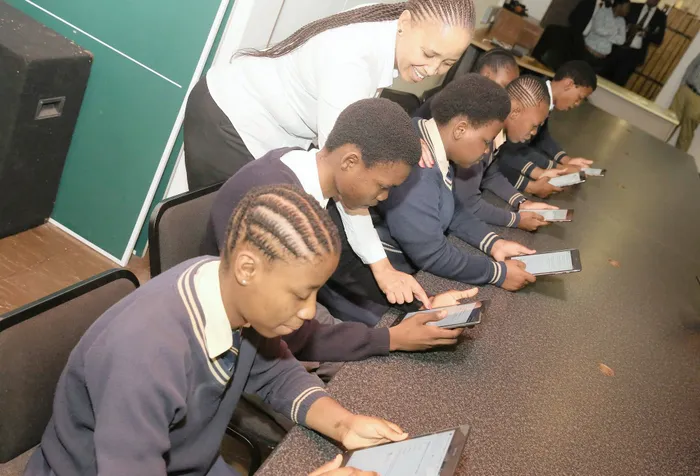Uncertainty over the president’s tablet plan

A teacher gives pupils assistance with using their new tablet computers. Zanele Zulu African News Agency (ANA) A teacher gives pupils assistance with using their new tablet computers. Zanele Zulu African News Agency (ANA)
Cape Town - South Africa’s education system is set for a major overhaul with the introduction of a tablet computer for every pupil in the country’s 23 700 government primary and high schools.
The ambitious plan to help prepare youngsters for the fourth industrial revolution has been met with mixed reaction from both education experts and the provincial department of education.
President Cyril Ramaphosa is due to outline the specifics of the programme when he delivers his State of the Nation Address in Parliament at next month.
The department of basic education said the programme would include computer coding for grades 1 to 3 and the digitisation of the curriculum with textbooks, workbooks and teaching material uploaded to the tablets.
Pilot programmes have been introduced or will be introduced this year to schools with special needs and at rural schools.
Western Cape Education Department (WCED) spokesperson Jessica Shelver said the department invested more than R252 million towards e-learning in the 2018/2019 financial year and over R1.2 billion over a five-year period.
These projects included smart classrooms with devices for teachers, ICT labs and an e-learning portal with educational materials among others.
Shelver said six schools have a ratio of one-to-one for pupil and device and by the end of 2019, the department would have delivered over 32 500 devices.
Education MEC Debbie Schäfer said there was “a desperate shortage of teachers and infrastructure. Given the increasing numbers of learners in our schools, and I am always told that there is no more money. How is there suddenly money for tablets?”
She said the department of basic education was digitising state-owned textbooks for pupils but claimed this did not suit all pupils, with interactive content a better solution.
Dr. Daniel le Roux from Stellenbosch University’s department of information science called the roll out “techno-optimism” because he was sceptical of the government’s ability to deliver.
“It’s this thinking that we can just throw tablets at a broken education system and we’ll fix our problems through technology, but it doesn’t work like that. It’s also one thing to manage a couple of tablets across a few schools, but to do it on over 23 000 schools is a massive undertaking that needs infrastructure,” said le Roux.
“I’m certain that tablets will bring a meaningful experience to children, but in terms of learning performance, the research is not clear.”
Education specialist Nic Spaull said while it was important to keep pace with the fourth industrial revolution greater emphasis needed to be placed on the basics like reading.
“Coding is an important skill for the 21st century but not more important than reading. If you can’t read, you can do very little else at school.
“If we don’t get the basics right in education, then all the work higher up in the system is destined for failure. Sixty-one percent of our Grade 5 learners can’t do basic mathematics, 78% of our Grade 4 learners can’t read for meaning in any language,” said Spaull.